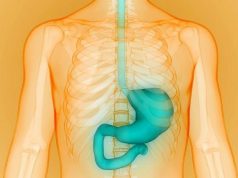The American College of Gastroenterology’s 81st Annual Scientific Meeting
The annual meeting of the American College of Gastroenterology was held from Oct. 14 to 19 in Las Vegas and attracted approximately 5,000 participants from around the world, including gastroenterology and digestive specialists and other health care professionals. The conference featured presentations focusing on clinical updates in gastroenterology and hepatology as well as the latest advances in digestive health and gastrointestinal disorders.
In one study, Kalpit Devani, M.D., of the East Tennessee State University in Johnson City, and colleagues found alcohol-related cirrhosis to be associated with significantly higher inpatient mortality, despite the mortality rate having decreased over the period of 2002 to 2011. The investigators also found that alcohol-related cirrhosis was associated with significantly higher cirrhosis-related complications, except hepatocellular carcinoma.
“Our study, which represents one of the largest real-world datasets to date, comprising nearly 4.3 million cirrhosis patients, shows that hospitalization and mortality rates for alcohol-related cirrhosis are decreasing, even though mortality for non-alcohol-related cirrhosis is down and hospitalizations are up,” Devani said. “In addition, patients with non-alcohol-related cirrhosis were older than patients with alcohol-related cirrhosis.”
The investigators also observed almost double the prevalence of non-alcohol-related cirrhosis among female patients. While there has been an increasing number of patients being hospitalized for cirrhosis-related complications like acute renal failure, spontaneous bacterial peritonitis, and hepatocellular carcinoma, hospitalization for variceal bleeding has decreased.
“Our study emphasizes the damage alcohol dependence/abuse has on the liver, which leads to further unfavorable outcomes. So we need to be more vigilant in detecting potential alcohol abuse and be aggressive in counseling for alcohol cessation,” Devani said. “Our study also reveals increasing hospitalization rates for patients with non-alcohol-related cirrhosis which have even surpassed that seen for patients with alcohol-related cirrhosis.”
Abstract No. 48
In another study, Yuri A. Saito, M.D., M.P.H., of the Mayo Clinic in Rochester, Minn., and colleagues found that patients with irritable bowel syndrome (IBS) who received pregabalin had lower rates of abdominal pain, diarrhea, and bloating compared to patients who received placebo.
“Pregabalin shows promise as an additional treatment option for IBS patients who are experiencing significant abdominal pain,” Saito said. “This study was a reasonably-sized pilot study, but a pilot study of 85 and not thousands of patients. So I hesitate to make firm recommendations based on this pilot study. Nonetheless, these data do suggest that for IBS patients with moderate-to-severe abdominal pain who have failed conventional treatments, clinicians may wish to consider pregabalin as a treatment option.”
Abstract No. 9
Miguel D. Regueiro, M.D., of the University of Pittsburgh Medical Center, and colleagues evaluated the implementation of a patient-centered medical home for inflammatory bowel disease (IBD).
“We enrolled patients with IBD into our medical home starting in 2015 and just completed our first year. Our objective for the first year was to enroll at least 300 patients and decrease emergency room and hospitalization rates (by at least 2 percent), but also improve quality of life for the patient,” Regueiro said. “We were able to enroll 323 patients and reduce emergency room visits and hospitalization by 50 percent. We were also able improve quality of life, specifically by increasing the quality of life score by nine points, which was statistically significant.”
Going forward, Regueiro anticipates other specialty medical homes with groups of patients being cared for by specialists. “In gastroenterology, we focused on IBD, but others are likely to see similar benefits; for example, neurology with multiple sclerosis and cardiology with heart failure,” Regueiro added.
Abstract No. 69
ACG: Vegetarian Diets May Not Be Significantly Heart Healthier
WEDNESDAY, Oct. 19, 2016 (HealthDay News) — Vegetarians appear to have no significantly lower risk of cardiovascular disease over 10 years compared to those who eat meat, according to a study presented at the annual meeting of the American College of Gastroenterology, held from Oct. 14 to 19 in Las Vegas.
Copyright © 2016 HealthDay. All rights reserved.







